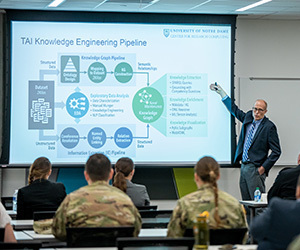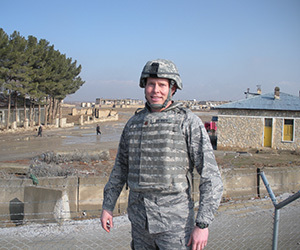Paul Brenner: Building a career of service
Paul Brenner, a ’98 graduate of Notre Dame, joined the Air Force ROTC program at the University while studying engineering as an undergraduate. In his senior year, he had to decide: go active duty or stay in the reserves and continue his education. He chose the latter. Since making that decision 24 years ago, Brenner has served on multiple deployments around the world. From 2008 to 2009 he engineered and built Air Force bases in Afghanistan. When he returned stateside, he helped build Notre Dame’s Center for Research Computing, where he currently serves as senior associate director and professor of the practice.
With a small but mighty staff of 50 people, Notre Dame’s Center for Research Computing supports $27 million in funding for research in advanced computing, computational biology, cybersecurity, data science, software and systems engineering and artificial intelligence.
Brenner broadened his expertise to include cybersecurity and cyberinfrastructure — which led to new opportunities with the United States Air Force. Brenner now serves as a reserve adviser to the USAF’s Air Education and Training Command, providing cybersecurity and cyberinfrastructure training for the largest educational organization in the United States — all part of a career of service to country, community and the classroom. Below is a Q&A with Brenner.
What does service mean to you?
I think of it as serving something bigger than yourself. Having a belief that there’s something bigger than our individual needs. Notre Dame does that. We believe, through faith and through service to the world — to do good is often to do something altruistic. I think there’s something altruistic to saying, “OK, I’m willing to go and follow orders and if need be, I’ll go into harm’s way, because I appreciate where I’m at today, I appreciate what I’ve been given, and I hope our children and our neighbors and the rest of our democratic country will also have those opportunities.”

Do you see that message resonate with your students and airmen?
Absolutely. I think in some regard, it’s the students we attract and the students we develop. There’s a student body here that wants to give back, wants to leave the world better than they found it, wants to make sure everybody has a home, make sure our cars are environmentally efficient, etc. ... There’s balance and prioritization — not just in a particular crisis but in all our life decisions. They’re able to say, “I can prioritize some basic necessities for myself but after that, let’s serve our country and the community.”
Many of our airmen, soldiers, sailors and Marines today come from a humble background, and working with these young men and young women with very different life experiences and even some hardships — I’m inspired that they’re still passionate about service and they’re passionate about doing good. They’re all looking to grow and succeed.
What aspects of your military service stand out to you?
Certainly, the leadership opportunity as far as the number of young men and women that we get to help in the defense of the nation. We get to lead them and get to grow them. Leadership in mission critical situations has given me a lot of opportunities for growth. I’m very thankful for the Department of Defense. I care about our country and participating in the defense of our democratic institution.
As far as my personal development, I’ve learned how to work within and be productive within a massive organization. The Air Force has given me the opportunity to travel and meet people from around the world. In the last five years alone, I’ve given cybersecurity briefings for the Department of Defense of the Philippines, was in Romania working with some of their senior folks in NATO cyber collaborations, trained allies in England on cyber mission analysis and supported managing our nuclear infrastructure.
How would you compare experiences in the military to campus?
There are absolutely some parallels. One example would be, you know, when we were in Afghanistan, there were times when an individual, an airman might feel isolated. They’re living in a plywood hut, they don’t have as much communication with family. They feel isolated from each other. So, your role is to help them be present in that time, and be productive.
And then years later, I had students here during COVID facing similar issues. We weren’t able to get out and see each other as much. People were feeling isolated. People weren’t able to communicate. Their normal was gone. Helping people through those moments of non-normal is one example. That certainly has been very helpful on both sides of the equation.

Starting out in ROTC as an undergrad, did you imagine the path your career would take?
I’m very thankful for this path. I think the correct path for me was always feeling like I was providing service to the betterment of the community. There are lots of ways to do that. For me it was faith that drove me to say, I will keep trying to serve in the capacities that are presented to me. I have certain things that I feel I’m good at, that I find interesting — STEM and technology has always been that for me.
To provide service in your career path, you look at your skill set. You work hard. My skill set leaned toward the technical. The doors were open to serve in the military, to come back and serve at Notre Dame, to build the Center for Research Computing — to use technology to aid all the great discoveries Notre Dame’s trying to make, whether that be next-generation energy sources or medical breakthroughs or even studying theological and philosophical texts. I’ve kept those doors open and balanced those opportunities with family. I tend to say — God, family, country, Notre Dame.
Originally published by at news.nd.edu on November 29, 2022.
Latest Research
- University of Notre Dame and IBM Research build tools for AI governanceMain Building (Photo by Matt Cashore/University of Notre Dame) …
- Smarter tools for policymakers: Notre Dame researchers target urban carbon emissions, building by buildingCarbon emissions continue to increase at record levels, fueling climate instability and worsening air quality conditions for billions in cities worldwide. Yet despite global commitments to carbon neutrality, urban policymakers still struggle to implement effective mitigation strategies at the city scale. Now, researchers at Notre Dame’s School of Architecture, the College of Engineering and the Lucy Family Institute for Data & Society are working to reduce carbon emissions through advanced simulations and a novel artificial intelligence-driven tool, EcoSphere.
- Seven engineering faculty named collegiate professorsSeven faculty members in the Notre Dame College of Engineering have been named collegiate professors—a prestigious title awarded by the university and college in recognition of excellence in research, teaching and service. The designation may be conferred on faculty at the assistant, associate or…
- ‘A special challenge’: German studies scholar wins National Humanities Center fellowship for research on medieval womenFor CJ Jones, the joy of research is not the answers but the journey. And the next step on that journey is a fellowship with the National Humanities Center. …
- Notre Dame Lead Innovation Team partners with local WIC program to identify, prevent lead poisoning in childrenB.A.B.E. store “shoppers” now have something new to help their families: free lead screening kits offered by the University of Notre Dame’s Lead Innovation Team.
- Notre Dame Welcomes Ninth Cohort of Warrior-Scholars for Transformative Academic JourneyNOTRE DAME, IN – The University of Notre Dame recently concluded its ninth successful Warrior-Scholar Project (WSP) boot camp, hosting 34 dedicated Warrior-Scholars from June 21st to 28th. This intensive, week-long academic residency provided transitioning service members and veterans…













